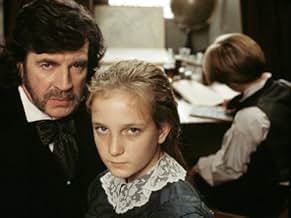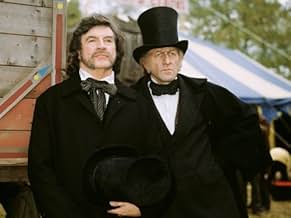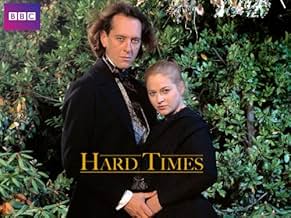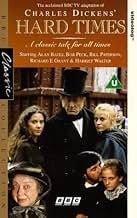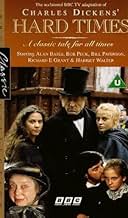Füge eine Handlung in deiner Sprache hinzuIn the first part of this adaptation by Peter Barnes, Tom and Louisa are first introduced to the audience.In the first part of this adaptation by Peter Barnes, Tom and Louisa are first introduced to the audience.In the first part of this adaptation by Peter Barnes, Tom and Louisa are first introduced to the audience.
Folgen durchsuchen
Empfohlene Bewertungen
This little known version of Hard Times is a magnificent adaptation of Dickens' novel about the life of a Victorian Family, set in a grim, dark place in the north of England called Coketown. The stellar cast, in particular Alan Bates and Bob Peck, get to the heart of Dickens intentions. There is none of the sanitisation you usually get with Dickens adaptations, this is a full blooded, and sometimes angry, production. The whole point of Dickens writing was to show people the plight of the poor working classes, the underclass, the people forced to live in grinding poverty and suffer starvation, disease and unimaginable squalor. People who had no choice but to work in factories and mills for incredibly long hours, while the mill and factory owners grew rich at their expense. People who died in terrible accidents at work because they were considered expendable and the machines were never allowed to stop. This production captures some of these intended messages perfectly. But in nearly all Dickens' works there are moments of great humour to lighten the darkness and in Hard Times the Slearys of the circus bring a smile or two. This film was originally made for the English syllabus in UK schools by the BBC so it may not be easy to find, but if you like your Dickens raw and honest, you should track it down.
The book of Hard Times can be very good at times and much of its description is captured on screen. However, I personally find these types of film occasionally dull but if you are keen to see the film-adaptation of the novel then enjoy. The film, in my view, is OK.
This 1994 adaptation of Hard Times does nobly with adapting Dickens in a relatively short length and to make it accessible to younger audiences. It doesn't quite come off, it does feel 20-30 minutes too short, too many scenes did feel rushed through and skimmed over and Beatie Edney even for someone deliberately cold acts too samey throughout and the constant frowning is overkill. However the costumes and sets are very evocative, not opulent by all means in fact it is a somewhat sparse approach, it succeeds in matching the emphasis on the darker aspects of the book and Dickens without feeling too much. The music has a good deal of atmosphere, while the script is funny, heartfelt and foreboding with some of the Dickenesian spirit present- though some scenes could have had more- and the story while truncated is still compelling and easy to understand. The adaptation is well-directed and also very well-acted. Bob Peck, gruff yet repentant towards the end) was the standout with the (I feel) most interesting and most developed character. Alan Bates acts with realism and professionalism, while Richard E. Grant is dashing and Dilys Laye is a real scene-stealer. In fact all the acting is good, with the only real source of reservation being Edney. Overall, not ideal for "purists" but while far from perfect on its own this adaptation is quite good. 7/10 Bethany Cox
Brilliantly directed this film I found by accident and I have watched it three times since I have seen it, and it is a combination of theatre and cinema. The interiors of the wealthy are covered in red curtains and wallpaper, signifying I thought of how much blood there is on their hands. Set in the 19th C it is one of the least read of Charles Dicken's novels and that is a pity as it is very appropriate for our times. The poor have feelings while the rich have reasoned out thoughts especially on the use of money. No spoilers but a young man played well by Christien Anholt fluctuates between reason and the heart. The wealthy and the rulers reason that the heart is simply an organ of the body, and the blood red of their decors again shows how the blood that pumps it are on their walls. An industrial worker is fired from his work and becomes literally another person to survive. The images of him at the last part of the film are gut wrenching. But to return to the actual filming. Fixed scenes often follow fixed scenes as in a theatre and this focuses the mind and heart of the viewer in my opinion. I urge anyone who values the dignity of every person to track down this BBC masterpiece. I call it a film because of the way it is experimentally constructed and in no way is it comparable to the formula of a serial. Peter Barnes directed and he is one of the greatest of the UK playwrights; the like of which we rarely see now on our stages.
I was very disappointed when I purchased this DVD of "Hard Times" by Dickens. I cannot recommend it as a Dickens fan and as someone who is often blessed to see mostly Andrew Davies Adaptations of classic literature for the BBC. The music is creepy like a B movie horror flick, the acting is stiff, the lighting is horrible , and it is all too obvious that the scenes were mostly filmed in badly propped studio spaces. I was especially upset that I disliked the movie since it was filled with so many of my favorite actors such as Alan Bates and Richard E Grant. The actor who played Gradgrind gave the only acceptable performance in my eyes. The only consolation was that the short story TV classic "The Signalman" (adapted by Davies!) was added to fill the end of the Disk.
Wusstest du schon
- WissenswertesLeft-handed Christien Anholt (Tom) is seen writing with his right hand, as Tom is right-handed.
- VerbindungenVersion of Hard Times (1915)
Top-Auswahl
Melde dich zum Bewerten an und greife auf die Watchlist für personalisierte Empfehlungen zu.
- How many seasons does Hard Times have?Powered by Alexa
Details
Zu dieser Seite beitragen
Bearbeitung vorschlagen oder fehlenden Inhalt hinzufügen



